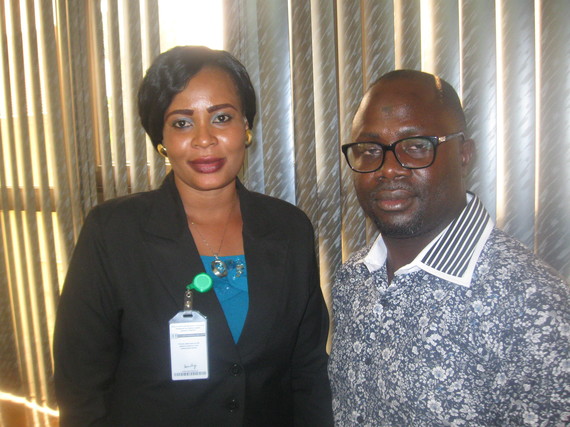A discussion with Wale Adeleye and Joy Uduak Okon of Civil Society for Family Planning, an NGO dedicated to addressing RMNCH advocacy, with a focus on family planning.
Champions for Change (C4C) is pleased to continue our ‘Meet the Champions’ Series. This bi-monthly blog series highlights the work of 24 Nigerian leaders currently participating as C4C champions. C4C’s Champions in Nigeria are working together to save the lives of mothers, children and young women through innovative advocacy and leadership development. Nigeria is Africa’s largest economy, and yet tens of thousands of women and children die there each year due to lack of maternity care, preventable disease and poor health infrastructure, among other causes. This series brings a diversity of perspectives from around Nigeria to the table to discuss this critical moment in Nigeria’s history and how Nigerians can work together to build a healthy future for all.
This is a special week in our series as all 24 Champions are currently convened in Lagos for our Champions Series II workshop, focusing on budgetary advocacy and planning. Read on for an interactive discussion with Wale Adeleye and Joy Uduak Okon of Civil Society for Family Planning, an NGO dedicated to addressing various aspects of RMNCH advocacy, with a special interest in family planning. They are based in Abuja and operate in all 36 states and the Federal Capital Territory.
Meet the Champions Series Interview #5
Champions for Change: As we know, there are many international non-profit organizations working in Nigeria. Why did you opt to be part of the PHI/C4C program specifically? What skills do you hope to acquire and what do you intend to do with this new knowledge and skills?
Wale: I am involved in the PHI/C4C program because it is going to build my capacity to really become a champion and push for the reproductive health rights of women. It will also well position me to advocate for necessary policies. I hope to acquire a strong set of advocacy skills which I intend to use to further the work of improving the lives of mothers in Nigeria.
Uduak: I am involved in this program because I want to develop my capacity and meet and learn from other champions. I hope to use the skills learned in this program for the development of Nigerian women and children.
C4C: Why are you a champion for women’s and children’s health issues in Nigeria?
Wale: I once worked for a health reform advocacy organization, which gave me insights into what women face in terms of their sexual and reproductive health rights. I vowed to become an advocate for women’s rights because reproductive health must be valued as a “best buy” by the Nigerian government and as a vehicle for improved maternal and child health. The area I am most passionate about in RMNCH is women’s sexual and reproductive health rights.
Uduak: I am passionate about women’s sexual rights. Working in the procurement department for Marie Stopes Nigeria is what first exposed me to the RMNCH field. My passion to work on programming within RMNCH grew as I learnt of the travails women face. Hence I was given the opportunity to work with CiSFP.
C4C: What is the biggest challenge you face as an advocate for women and children’s health?
Wale: The biggest challenges I face in this work are religious and cultural factors which inhibit our advocacy efforts.
Uduak: The biggest challenge for me is convincing policy makers to support our advocacy issues.
C4C: What success are you most proud of in your professional career?
Wale: One major success was the recent approval for the enlistment of Emergency Contraceptives on Nigeria’s Essential Drug List (EDL) and of course the signing into law of the National Health Act.
Uduak: I am most proud of the fact that I have never failed in any project I embarked upon. I am always achieving and succeeding in all my career plans.
C4C: What’s your vision for the future of health care in Nigeria?
Uduak: My vision for the future of Nigeria’s health system is for free health care at the primary level. I’d also like to see an improvement in the capacity of health workers.
Wale: My vision for the future of Nigeria’s health system is such that health is not only equitable, but accessible and affordable to all, irrespective of status. When women, newborns, and children have adequate access to good quality health services and information there will be new life and new possibilities.
C4C: What is your favorite song of all time?
Uduak: I Believe I Can Fly by Robert Kelly.
Wale: We Are the World by Michael Jackson and Lionel Richie.
C4C: What is your favorite thing to do when you want to relax?
Uduak: I research, surf the internet, watch movies and read motivational books.
Wale: I like to read, dance and listen to music.
Stay tuned for the continuation of this series featuring more Nigerian advocates. Meanwhile, we invite you to follow us on Twitter at@C4C_Champions and use the hashtag #MeetTheChampions to engage more closely with the blog series, the work of the 24 leaders whose work is being highlighted, and the larger conversation surrounding reproductive, maternal, newborn and child health in Nigeria.
Champions for Change saves the lives of women and children in Nigeria by empowering local leaders and organizations to improve reproductive, maternal, newborn and child health through advocacy, education, storytelling and strategic partnerships. Champions for Change leverages a program model developed by its sister initiative, Let Girls Lead, which has contributed to improved health, education and livelihoods for more than 3 million girls globally since 2009. This powerful model drives change through the passage of national laws, implementation of programs and distribution of funds to ensure access to quality healthcare, education and economic opportunity.
Champions for Change and Let Girls Lead are headquartered at the Public Health Institute in Oakland, CA, a leader in global health and development for 50 years.



